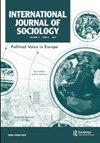Grievances and political action in Russia during Putin’s rise to power
IF 1.1
Q2 SOCIOLOGY
引用次数: 2
Abstract
Abstract Under conditions of electoral authoritarianism, in what ways do individuals’ dissatisfaction with democracy influence their probability of political action? In the early 2000s, President Vladimir Putin consolidated his power and Russia descended into electoral authoritarianism. In this closed political opportunity structure, through which the government worked to silence political opposition and the global financial crisis caused an economic decline, the conditions for political and economic grievances to arise were plentiful. At the same time, political action by ordinary citizens was possible, though not prevalent. To examine the association between political and economic grievances and ordinary Russians’ political action, I use the five available waves of the European Social Survey 2006 to 2016. Results suggest that political grievance was a driving force of political action in Russia. Dissatisfaction with democracy in Russia motivates non-electoral participation (NEP) but alienates citizens from voting. Models with the interaction between political grievances and the conditions of economic grievance were insightful: when economically advantaged citizens are satisfied with the current regime, they tend to support it through the ballot box. The disconnect between NEP and voting with regard to political grievance suggests the need to better understand how ordinary Russians define and appreciate democracy.普京上台期间俄罗斯的不满和政治行动
在选举威权主义条件下,个人对民主的不满如何影响其政治行动的概率?21世纪初,弗拉基米尔•普京(Vladimir Putin)总统巩固了自己的权力,俄罗斯陷入了选举威权主义。在这种封闭的政治机会结构中,政府努力压制政治反对派,全球金融危机导致经济衰退,政治和经济不满情绪的出现条件很多。与此同时,普通公民的政治行动是可能的,尽管并不普遍。为了研究政治和经济不满与普通俄罗斯人政治行动之间的关系,我使用了2006年至2016年欧洲社会调查(European Social Survey)的五波可用数据。结果表明,政治不满是俄罗斯政治行动的推动力。对俄罗斯民主的不满激发了非选举参与(NEP),但疏远了公民投票。政治不满和经济不满之间相互作用的模型很有见地:当经济上有优势的公民对当前政权感到满意时,他们倾向于通过投票箱来支持它。新经济政策和投票在政治不满方面的脱节表明,有必要更好地理解普通俄罗斯人如何定义和欣赏民主。
本文章由计算机程序翻译,如有差异,请以英文原文为准。
求助全文
约1分钟内获得全文
求助全文

 求助内容:
求助内容: 应助结果提醒方式:
应助结果提醒方式:


